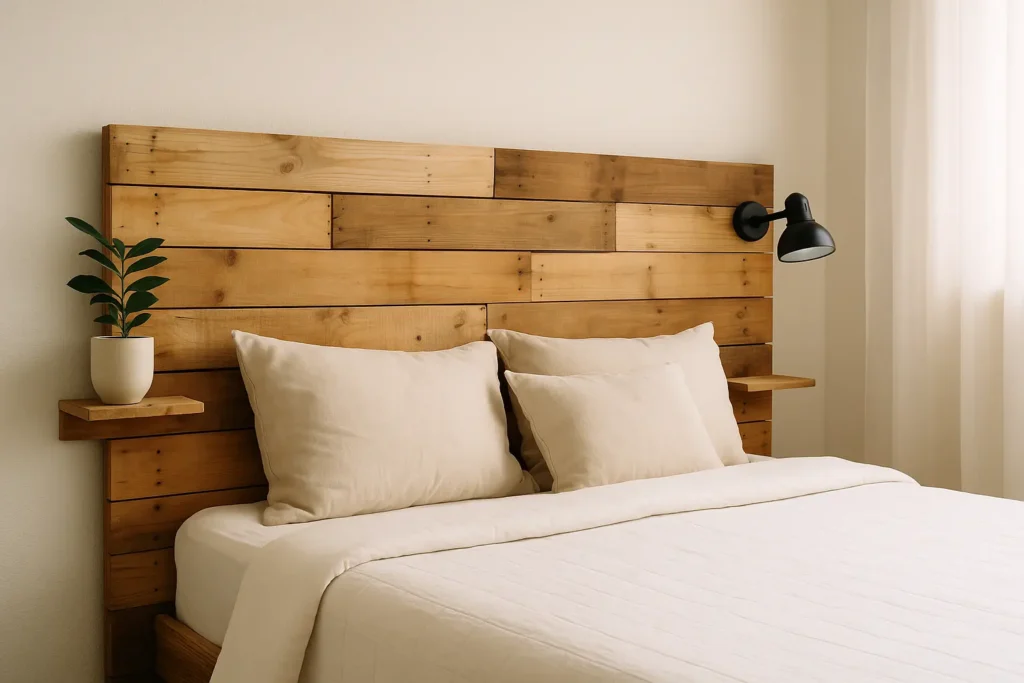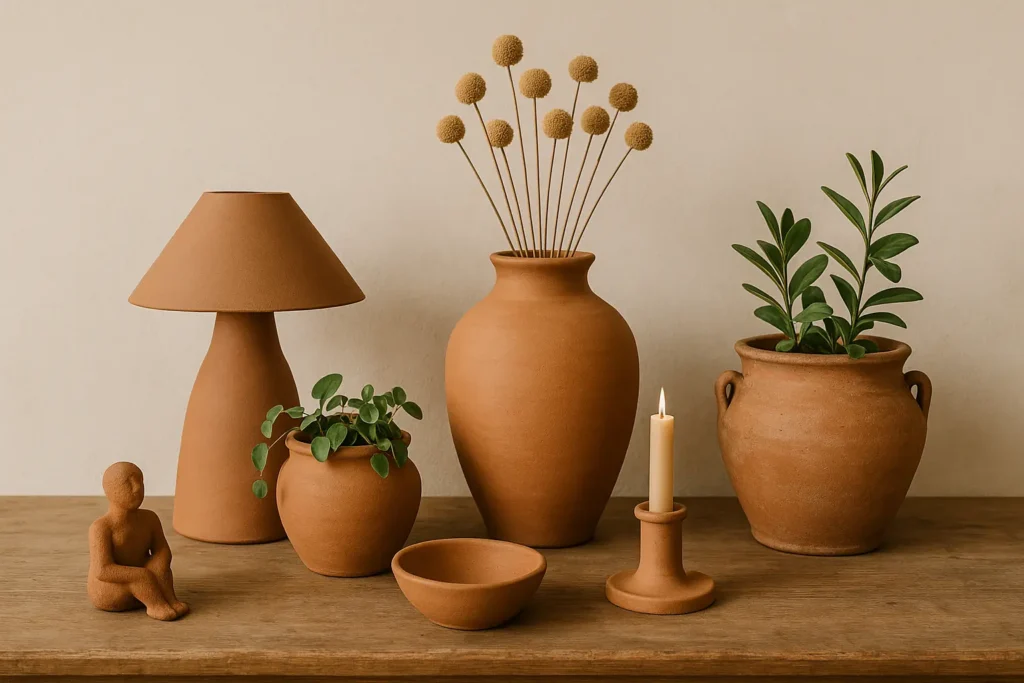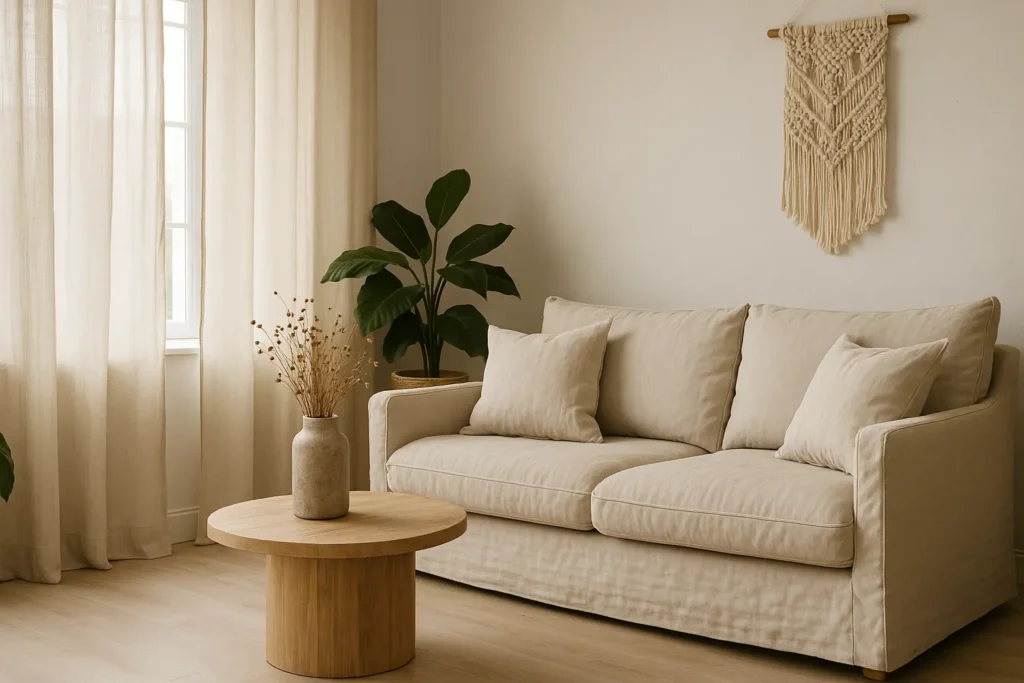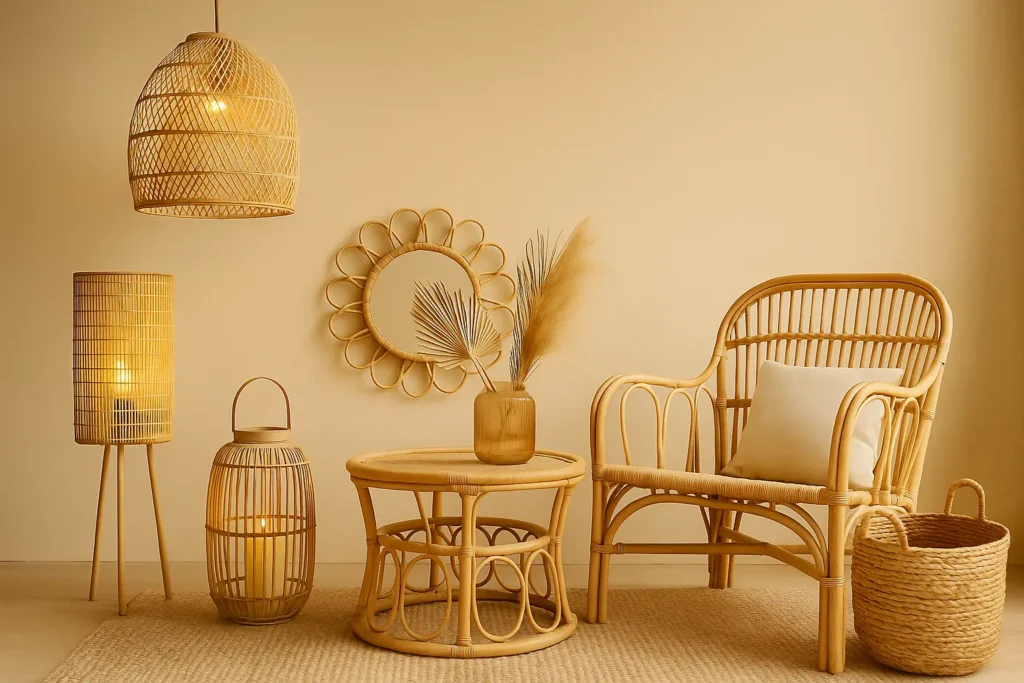Elm wood is a wood with expressive grain and warm tones that instantly transforms the atmosphere of a room. HouseWhether it's a finely crafted chair or a majestic table, each piece of elm wood furniture tells a story and adds a natural touch to your decor. In a world where authenticity and a return to noble materials are gaining ground, elm wood is establishing itself as a choice of character for our interiors. Let's see why elm wood deserves a place of choice in our homes today, and how it can enhance your living space with elegance and durability.
Our article in brief:
Elm wood, a noble material with expressive grain, transforms interiors with elegance and authentic character.
- Remarkable properties : balanced density of 640 kg/m³, excellent compressive strength and pronounced veining creating unique patterns on each piece.
- Aesthetic diversity : three European species offering shades ranging from reddish to chocolate brown for the field elm, to the light gray tones of the floating elm.
- Decorative versatility : adapts to all styles, from rustic bistro chairs to contemporary creations combining elm and epoxy resin.
- Easy maintenance : a soft cloth for daily cleaning and a specific wax to preserve the natural shine of the wood.
Summary
The elm, this tree with unique characteristics
The Elm is a tree belonging to the family of UlmaceaeThis tree family has no fewer than 41 species listed throughout the world. In Europe, three main species have shaped our movable heritage:
- the field elm Or Ulmus minor
- mountain elm Or Ulmus glabra
- the floating elm
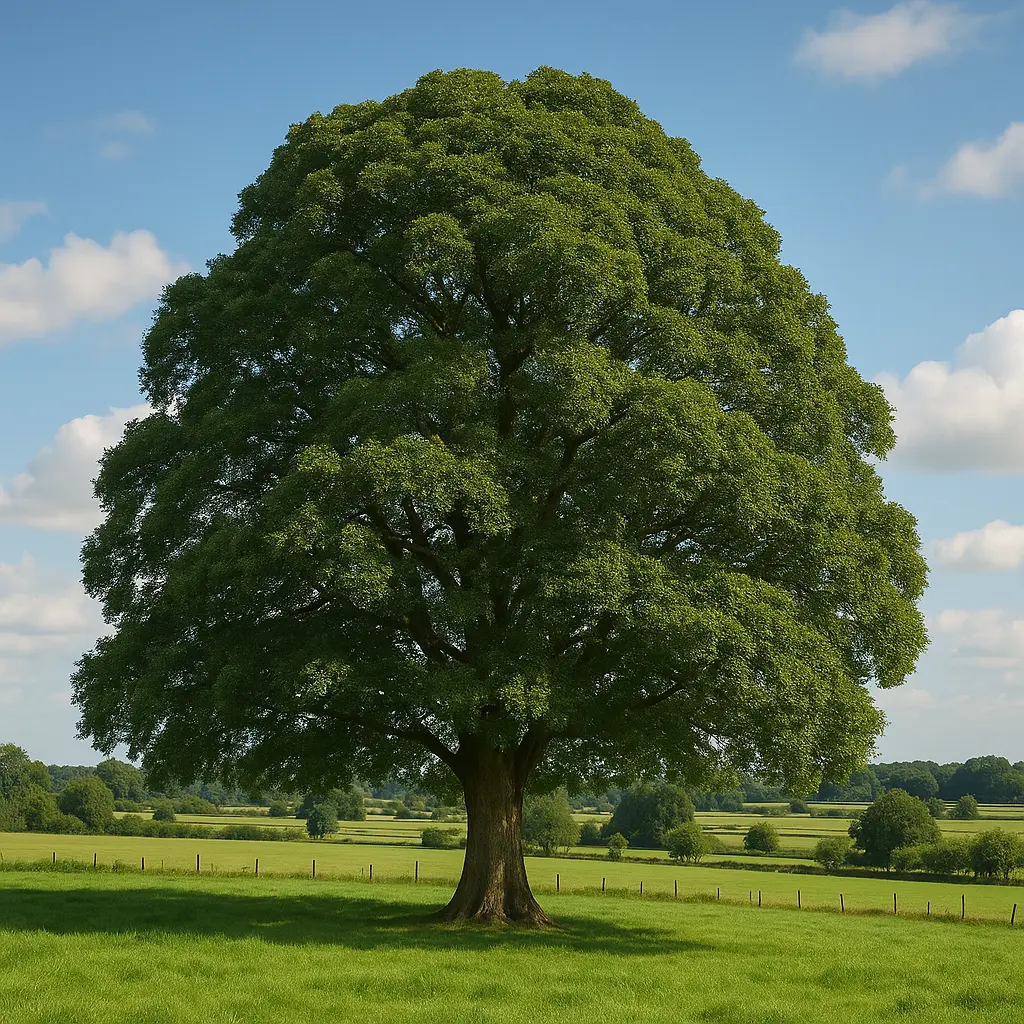
Each elm, every tree has its own personality, with subtle nuances and distinctive characteristics specific to natural elm wood.
With a density of 640 kg/m³, this moderately heavy timber strikes a perfect balance between strength and workability. Its exceptional compressive strength makes it an ideal candidate for the manufacture of furniture for everyday use. THE craftsmen particularly appreciate its docility during manual or mechanical work, allowing for remarkably precise finishes to create unique pieces.
Mechanical and aesthetic properties of elm wood
Elm wood stands out for its pronounced grain which creates fascinating patterns on the surfaces of your furniture and traysThis visual singularity makes each piece a unique work, impossible to reproduce identically. Its natural tendency to darken when exposed to sunlight adds to its charm, allowing your furniture to develop a vibrant patina over the years.
Its particular structure, with a differential radial shrinkage of 0.17 to 0.20% and a tangential shrinkage of 0.27 to 0.29%, gives it appreciable stability for the production of durable furniture. This technical quality, combined with its warm aesthetic, explains why elm is so prized by designers and craftsmen who are looking for noble materials for their exceptional creations.
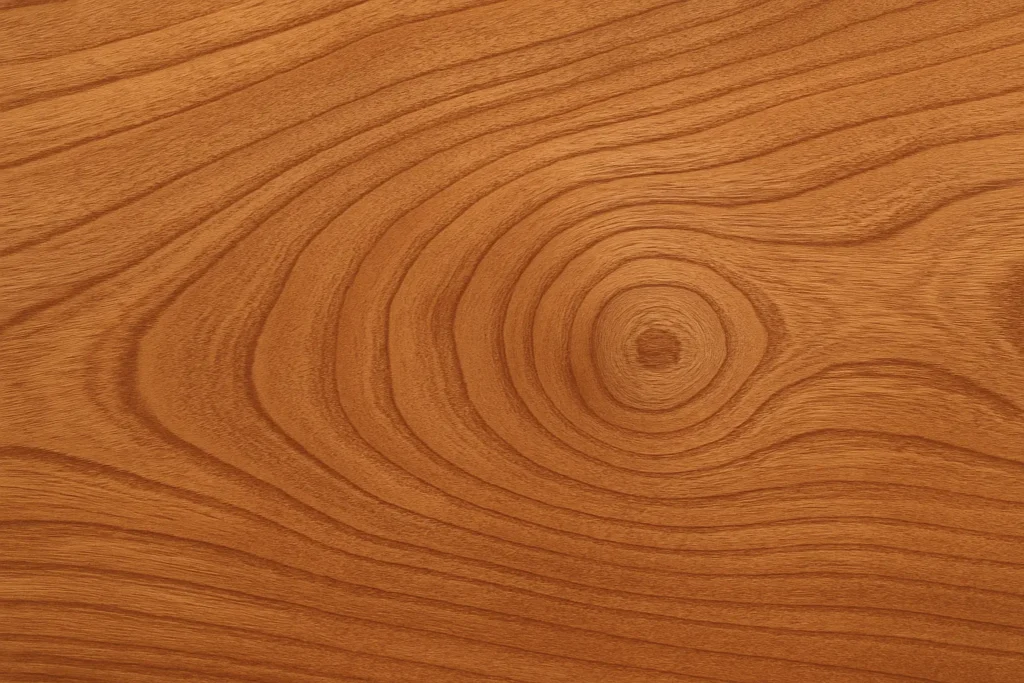
The different species of elm and their uses
The trained eye will be able to recognize the three European elm species by the distinctive colors of their heartwood:
- Field elm reveals shades ranging from reddish to chocolate brown, perfect for warm interiors
- Mountain elm has a light brown to flesh-red heartwood, providing brightness and character.
- The floating elm stands out thanks to its light gray to brown tones, ideal for more contemporary atmospheres
The many uses of elm wood: much more than just one use
If elm wood Seduced at first glance by its unique aesthetic, its uses go far beyond interior design. Long used in fields as varied as carpentry, cabinetmaking and shipbuilding, elm has proven its robustness and versatility over the centuries. Even today, it remains a material of choice for those looking for a noble, durable and expressive wood.
In interior carpentry: a charming ally
In carpentry projects, elm wood finds its place naturally. It is found in the creation of parquet floors with warm reflections, stair treads, interior doors or even wall woodwork, where it deploys its full aesthetic potential thanks to its unique grain. Its ability to be worked with precision also allows the creation of moldings and custom elements, bringing character to every corner of the house.
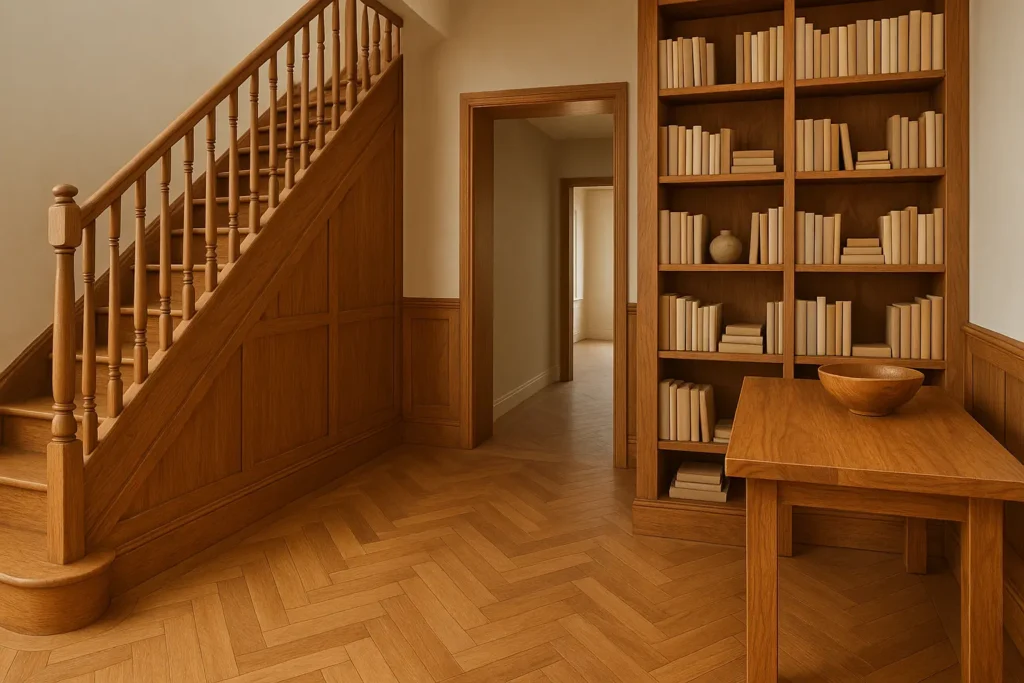
In cabinetmaking: a noble wood for exceptional pieces
Elm is particularly prized by cabinetmakers for the manufacture of custom furniture, desks, sideboards, and bookcases. Its supple yet durable texture allows for careful assembly and subtle finishes. Combined with other natural materials such as leather, linen, or brass, it helps create high-end pieces with a timeless appeal.
A safe bet in renovation and restoration
Thanks to its structural solidity and its good resistance over time, elm wood Elm is often used in renovation or restoration projects for antique furniture. Its dense and stable heartwood allows historic pieces to be brought back to life, while preserving their original soul. A simple sanding and the application of a natural oil are sometimes enough to reveal the beauty of an elm tree that has remained untouched for decades.
Outdoor use: handle with care
Although the elm is not naturally rot-proof, some species, such as floating elm, show better resistance to humidity. Used with suitable treatment, elm wood can be used to make benches, planters, or outdoor furniture, provided it remains protected from the elements. A suitable oil or saturator will extend its longevity and preserve its shine throughout the seasons.
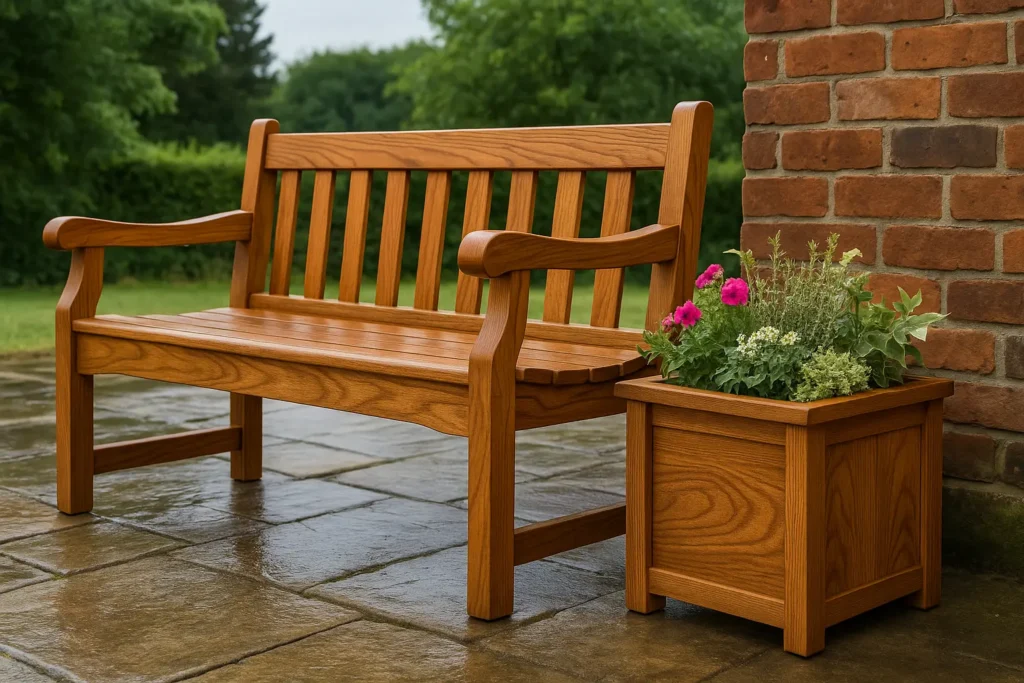
Elm wood furniture and chairs for a warm interior
THE elm wood chairs perfectly represent the alliance between artisanal tradition and timeless elegance. Bistro-style models in dark elm bring an authentic ambiance to your dining room, while creations combining elm and natural rattan bring a welcome visual lightness to contemporary spaces.
To create a harmonious ensemble, elm wood dining tables are the perfect complement to your chairs. Their expressively grained tops often become the focal point of the room, inviting conviviality and shared moments. The natural beauty of this wood transforms each meal into a complete sensory experience, where your eyes delight in following the undulations of the grain beneath your fingers.
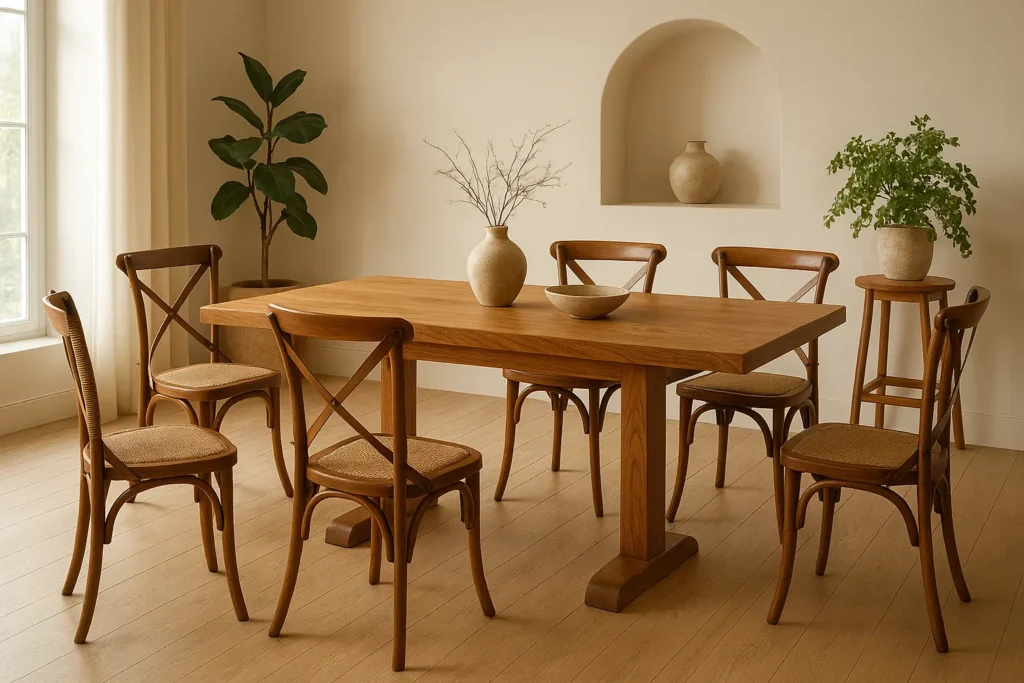
Elm wood chairs: a variety of styles
From the sleek Scandinavian model to the more rustic lines inspired by the countryside, elm wood chairs fit into any decorative styleSome manufacturers offer designs combining elm with epoxy resin, creating contemporary pieces where transparency and natural materials elegantly interact.
For a more ethnic style, models incorporating woven rattan elements offer a particularly attractive combination of textures. This combination of natural materials creates comfortable and visually light seats, perfect for bright interiors that celebrate the beauty of raw materials.
Tables and other furniture in solid elm for a coordinated ensemble
Beyond chairs, elm wood lends itself beautifully to the creation of sideboards, shelves and photo frames that complement your decor. Enthusiasts particularly appreciate it. elm burl frames Available in different widths (1 cm, 1.5 cm, 2 cm, 3 cm), which beautifully showcase your precious memories.
| Type of furniture | Characteristics of elm wood | Ideal interior style |
|---|---|---|
| Bistro chairs | Dark elm, matte finish | Rustic, country chic |
| Dining table | Solid elm top, visible grain | Contemporary, Scandinavian |
| Shelves and sideboards | Light elm, visible structure | Minimalist, Japanese style |
| Frames and decorative objects | Elm burl, warm tones | Eclectic, bohemian |
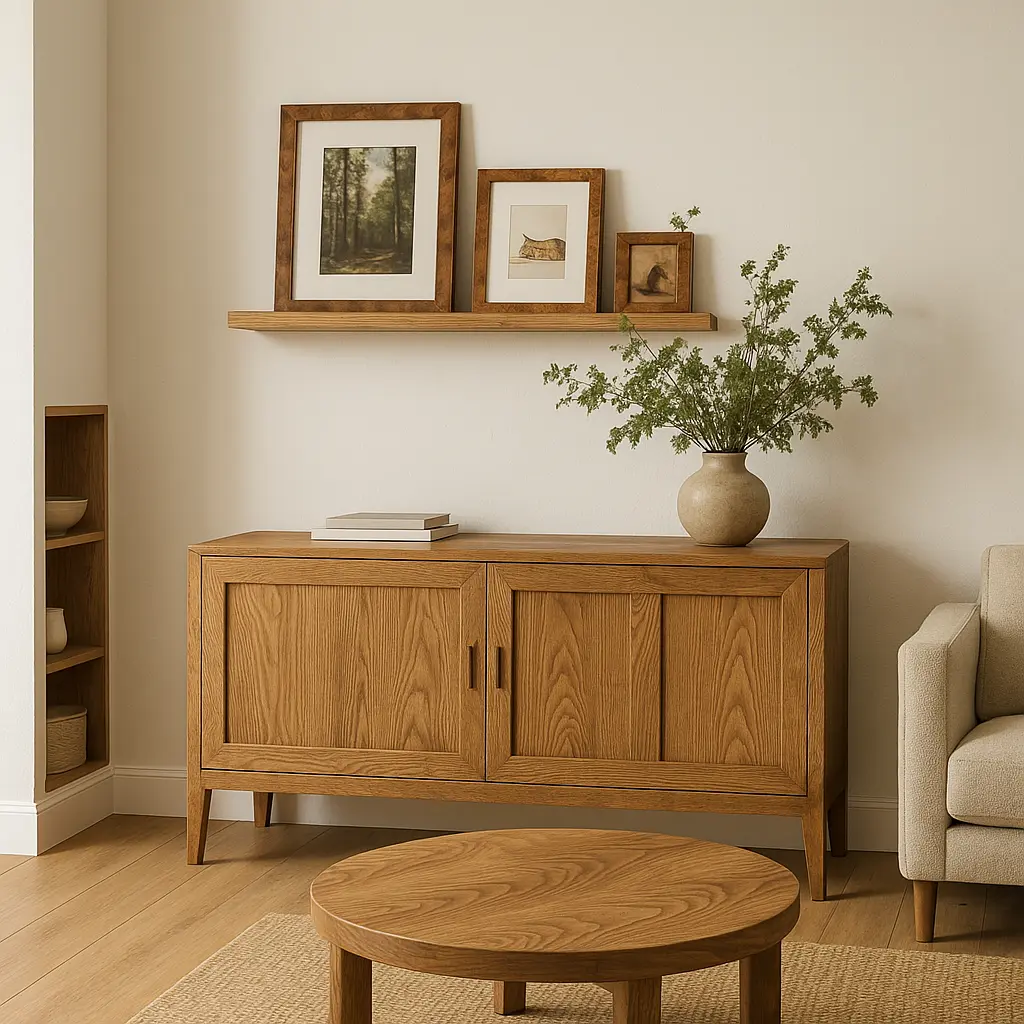
How to maintain and preserve the elm wood of your furniture?
To maintain the beauty of your elm furniture over the years, a few simple steps are all it takes. Regular maintenance with a specific wax for elm wood nourishes the material and preserves its natural shine. Conversely, polishing products should be avoided as they risk altering the unique patina of this wood.
Daily cleaning requires only a soft, dry cloth to remove dust. For furniture with a surface treatment, simple regular dusting is usually enough to maintain its shine. The beauty of elm wood lies in its ability to age gracefully, each mark of wear telling a story and adding character to your piece..
Daily cleaning and protection
For light stains, use a cloth very lightly dampened with mild soapy water. Always wipe immediately afterward with a dry cloth to prevent moisture from penetrating the wood. Protection against standing liquids is essential, as they can leave permanent marks on the surface of your elm furniture.
Stain treatment and restoration
When faced with a more stubborn stain, patience is essential. Avoid harsh products that could damage the finish. For unfinished furniture, a light sanding followed by an application of natural wax can bring the surface back to life. Remember that the sapwood is easily impregnated while the heartwood remains more resistant to treatment, a feature to consider during any restoration.
Elm wood, a sustainable and responsible choice
In recent decades, the elm has faced significant challenges. The phenomenon of "elm dieback" caused by the bark beetle, an insect vector of a fungal disease, has significantly reduced field and mountain elm populations. Fortunately, cross-border research on the preservation of elm wood have made it possible to develop resistant varieties which ensure the sustainability of this precious species.
The floating elm, naturally protected by substances present in its bark, has been spared from this disease, offering a sustainable alternative. For a truly eco-responsible choice, choose FSC-certified elm wood furniture (Forest Stewardship Council), guaranteeing forest management that respects ecosystems and local communities.
Choosing the right elm wood furniture for your interior space
Choosing your elm furniture depends primarily on the ambiance you want to create. For a bright, contemporary interior, opt for light elm pieces with clean lines. If you prefer a warmer, more cozy atmosphere, dark elm furniture with generous shapes will bring the desired character.
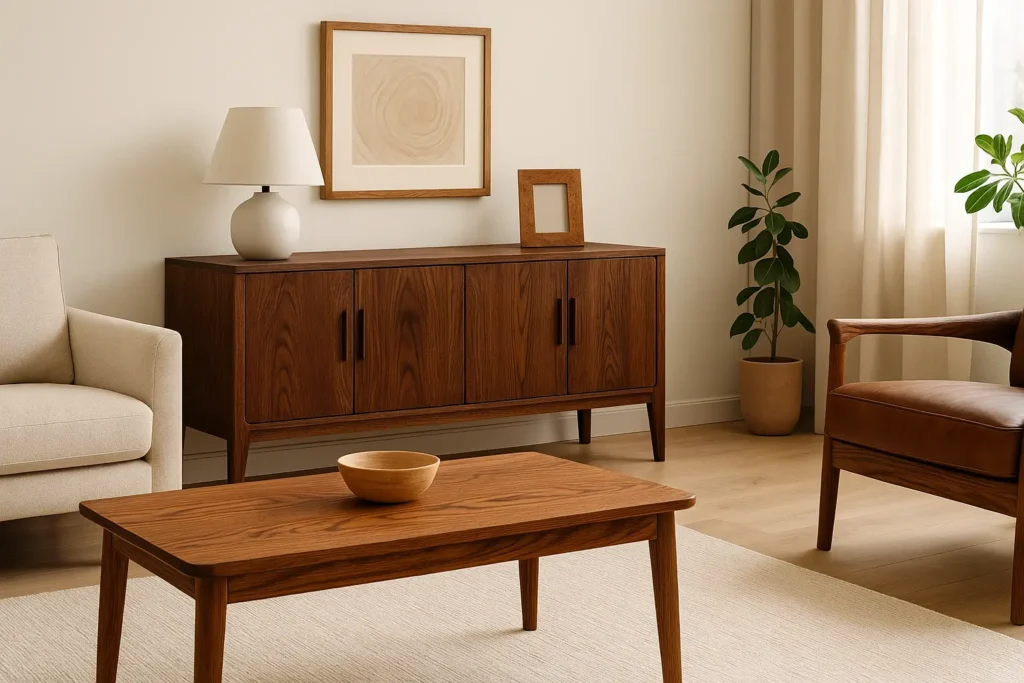
Finishes also play a crucial role in how your furniture blends into your decor. Oil highlights the natural grain while providing subtle protection, while wax adds a more pronounced patina that will improve over time. trays intended for intensive use, a finish combining epoxy resin and elm wood offers durability and contemporary aesthetics, particularly appreciated in custom creations.


